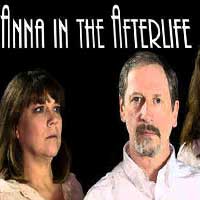
Richard Engling’s “Anna in the Afterlife” is a play based on his friendship and collaboration with Fern Chertkow: a friend, writer, and colleague who took her own life in 1988. Because so much of the takes play in the afterlife, I would hesitate to call it autobiographical, but among the many new plays I have seen produced, it is deeply and refreshingly personal and obviously based, at least loosely, around the life, and more importantly death, of Engling’s friend: Fern Chertkow, and his own various travails with apparent mental illness.It case anyone doubted the personal nature of the play, the playwright and lead actor are one in the same.
After contracting cancer, writer Matthew Harken (Richard Engling) is in a coma which has left his soul in some sort of purgatorial limbo—it’s not hell or paradise–where he has been reunited with his friend Anna Toevsky who committed suicide and who is split into three persons: a child (Sarah Eddy), a young woman (Shelia Willis) as he remembers her, and a middle-aged “afterlife Annna” (Ellyn Nugent). His dear, gay, friend Elliot (Kevin M. Grubb) who thought (very seriously) about suicide and who concedes that he smoked himself to death, and Matthew’s graduate school mentor, writer Carol Berge (Jean Marie Koon), are also there. They reminisce about and remember the past (Elliot implies this all they can do, at least at the moment), particularly the lives of Anna and Matthew: the circumstances leading up to Anna’s suicide and the choices Matthew has made and what they have meant to his own life and what situation he will have left his family in if he dies. Anna, who desperately wants him to stay, urges him not abandon her now that they are finally together, but Elliot reminds him that his daughter Rebecca (Shannon Nicole Hill) who Matthew once dreamt “would be reincarnation of Anna” is standing over his bed, futilely trying to call him back from a coma, and that his decision to stay or go will affect the future either in his natural life or the beyond. 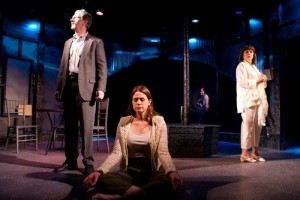
The play is marked by the superlative direction of Susan Pavdeen’s, some good technical choices, and with the highly notable exception of Engling, strong performances by the lead actors. In particular, Pavdeen’s direction and blocking capitalizes and builds on the intensity and tension of Engling’s affecting script whose plot is complex, rich, and psychologically sophisticated even if at times his dialogue doesn’t exactly rise to the level of Miller or Williams: “what unfinished business are you leaving,” “smoking can kill you,” “my mother never wanted me,” etc. Pavdeen seems to know both exactly where to place her actors on stage and how block their movement in ways which emphasize what is happening interpersonally: bonding; alienation; resentment; acusation; anger, and interior crisis. There are some very haunting moments happen behind a hazy curtain that is used extremely effectively.
As a playwright, Engling has divided the show into two acts: the first moves slowly. We discover the basic outline of Matthew’s life: how he met Anna in college, their brief stint living in Paris and becoming novelists together, Matthew’s courtship and marriage to a visual artist called Patty (Shawna Tucker), and the birth of his daughter Rebecca (Shannon Nicole Hill). We also meet Anna’s first husband Yousef (played by James Bould who gives a brief but incredibly intense and passionate performance as a Muslim who gave up his family to marry the Anna, and who after being warmly welcomed by her Jewish mother feels betrayed by the secrets Anna keeps from him which deeply affect his life (In Bould’s hands one couldn’t help but be sympathetic).
Both Anna and Matthew’s suicidal ideation and his reaction to her death are (intentionally, I think) tiresome and clique in the first act. Early in their friendship they admit to constantly thinking about suicide, but we never discover why beyond some stated sophistic philosophical abstractions. When Anna does die, the reaction of Matthew is characterized by anger, not empathy or compassion. He puts out his cigarette in a Zen sand box that Anna used to “rake daily” and which “he had to know was sacred [to her]” because he is angry: the personal equivalent of burying a suicide at crossroad or denying them religious funerary rites.
In the second Act, we learn more about the cause of Anna’s death. The pain of a lifetime must be displaced, endured, projected, silenced, and disassociated remains necessary to protect her even in death. Not only does she still have to disassociate to protect herself, but Matthew can still send the persons of Anna’s trinity spiraling into agonizing trauma when asking a revealing question. All three Anna’s give highly credible performances: Ellyn Nugent is wise, sardonic, and constantly actively observant as the afterlife Anna; Sheila Willis is able to convey a light-hearted flightiness than one slowly recognizes is a pure veneer, and Sarah Eddy: the hyper-vulnerability of an abused child. 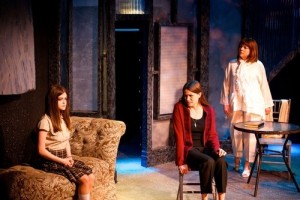
Matthew supposedly struggles with some sort of illness and we are meant to see moments of mania (his proposal) and intense dysphoria, but Engling, as an actor, is never able to capture either state, particularly the latter, and seems entirely unsure what to do with his body as a performer. As a consequence, he comes off as naïve, superficial, and terribly, terribly earnest. He seems more like Mr. Rogers than someone we could conceive of as in madness or pain, producing a great amount of cognitive dissonance on the part of the audience members as he can’t execute a part that is presumably based on him. It also makes his poor moral and life choices less sympathetic than they should me.
Fortunately, Shawna Tucker balances the show by giving what is by far the strongest performance in the play as Matthew’s wife Patti: she is a competent, visual artist, who wants a normal, happy life, but has fallen in love with Matthew and all his baggage. From the beginning, there are problems: he is eager to pathologize her, he lives a moderate bohemian lifestyle with which she is uncomfortable, and sometimes poorer life and moral choices from Matthew than she expected (Again, it doesn’t help that during the production, that Engling never seems ill, even though his character exhibits the signs of mental illness.) Nonetheless, Tucker is by turns, sexy, intelligent, cheerful, artistic, damaged, hurt, and her performance is constantly authentic whether she is displaying humor, warmth, sensuality or pathos.
Jean Marie Koon, who is very charming as a “New York Jewess with this accent,” and Kevin Grubb are able to provide suitable comic relief as Matthew’s friends although Grubb performance could be lackluster in time, especially in his scenes with Engling, but not enough for my guest complained that the show with suicide, abortion, child-abuse, aids, and self-mutilation “was too much [for the audience] to endure,” echoing Anna’s claim that she lacked in her death: “suicide: that is puts the fatal in fatal mental illness.” The Set Design (Ann Davis) is fantastical, but flexible enough to allow for scenes from biological life. The projections design (Paul Deziel) and lighting (Benjamin L. White) seemed week and bizarre, but how do you light the afterlife?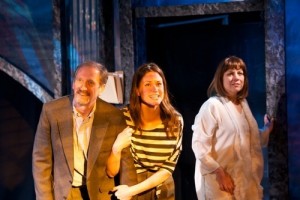
Polarity Theatre Ensemble is producing Richard Engling’s “Anna in the Afterlife.” It runs at the The Greenhouse Theatre Center located at 2557 N. Lincoln Avenue, Chicago through Sunday May 24th `2015. Productions are Thursday through Saturday at 8:00 pm and Sundays at 3:00 pm Regular Tickets are 25 dollars. Students Tickets are Ten dollars. Seniors: 20 dollars. They can be purchased at www.petheatre.com or by calling 773-404-7336 . There is limited parking in the area and 100 free spaces in the old Children’s Memorial Hospital garage just north of the theater.
To see what others are saying, visit www.theatreinchicago.com, go to Review Round-up and click at “Anna in the Afterlife”




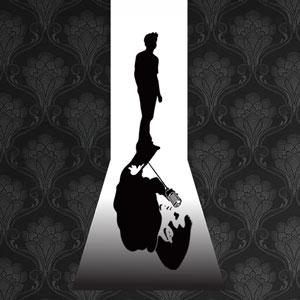
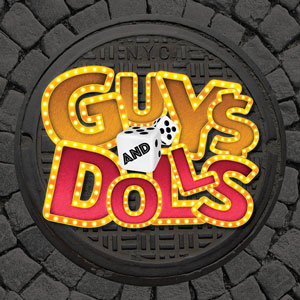

More Stories
“Elvis Presley Was a Black Man Named Joe” reviewed by Julia W. Rath
“Guys and Dolls”
“Dummy in Diaspora”